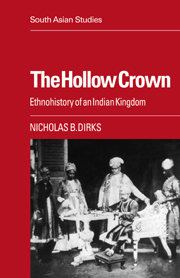Book contents
- Frontmatter
- Contents
- List of illustrations
- List of maps
- List of tables
- Preface
- Glossary of terms
- Map 1 Madras Presidency, 1900
- Map 2 Pudukkottai State
- The Tondaiman line of Pudukkottai
- PART 1 INTRODUCTION
- PART 2 HISTORY AND ETHNOHISTORY
- PART 3 A LITTLE KINGDOM IN THE OLD REGIME
- PART 4 SOCIAL RELATIONS OF A LITTLE KINGDOM
- PART 5 COLONIAL MEDIATIONS: CONTRADICTIONS UNDER THE RAJ
- 10 Agrarian rebellion? Last gasp of the old regime
- 11 The colonization of the political order: land settlements, political intervention, and structural change
- 12 Temples and conflict: the changing context of worship
- 13 The theatre state: princely politics in colonial south India
- PART 6 CONCLUSION
- Appendix: Land and privilege: inams in Pudukkottai
- References
- List of records and abbreviations
- List of archives and record offices
- Index
- CAMBRIDGE SOUTH ASIAN STUDIES
12 - Temples and conflict: the changing context of worship
from PART 5 - COLONIAL MEDIATIONS: CONTRADICTIONS UNDER THE RAJ
Published online by Cambridge University Press: 25 October 2009
- Frontmatter
- Contents
- List of illustrations
- List of maps
- List of tables
- Preface
- Glossary of terms
- Map 1 Madras Presidency, 1900
- Map 2 Pudukkottai State
- The Tondaiman line of Pudukkottai
- PART 1 INTRODUCTION
- PART 2 HISTORY AND ETHNOHISTORY
- PART 3 A LITTLE KINGDOM IN THE OLD REGIME
- PART 4 SOCIAL RELATIONS OF A LITTLE KINGDOM
- PART 5 COLONIAL MEDIATIONS: CONTRADICTIONS UNDER THE RAJ
- 10 Agrarian rebellion? Last gasp of the old regime
- 11 The colonization of the political order: land settlements, political intervention, and structural change
- 12 Temples and conflict: the changing context of worship
- 13 The theatre state: princely politics in colonial south India
- PART 6 CONCLUSION
- Appendix: Land and privilege: inams in Pudukkottai
- References
- List of records and abbreviations
- List of archives and record offices
- Index
- CAMBRIDGE SOUTH ASIAN STUDIES
Summary
Mine honour is my life, both grow in one;
Take honour from me, and my life is done;
Then, dear my liege, mine honour let me try;
In that I live, and for that will I die.
Shakespeare, Richard II, I.iThe centrality of temples in Pudukkottai's history is perhaps nowhere more evident than in the conflicts that developed over issues related to temples. These issues involved rights and privileges concerning worship, honors, festivals, temple management, and service in temples. In this chapter I will give examples of some of these disputes, demonstrating the kinds of structural cleavages and ideological issues that were crystallized and activated by dispute and conflict in and over temples. In examining these cases, it is impossible to ignore the fact that the petitions, counter-petitions, evaluations, and judgements were generated in a particular bureaucratic context, far different from previous contexts in which these disputes, themselves vital components of the old regime political system, were resolved directly by the Raja, the Cervaikarar, the nattampalam, or the ampalam, depending on the level and nature of conflict.
We have seen that disputes of this type were omnipresent and often crucial in the old regime. For example, the great war between the Konatu and Kanatu Vellalars began largely as a dispute over temple honors.
- Type
- Chapter
- Information
- The Hollow CrownEthnohistory of an Indian Kingdom, pp. 358 - 383Publisher: Cambridge University PressPrint publication year: 1988



